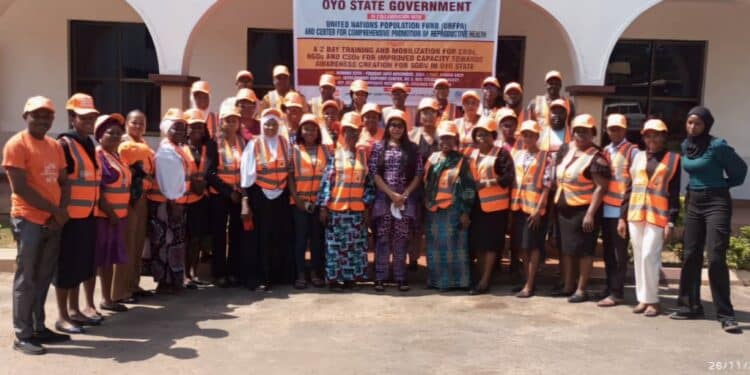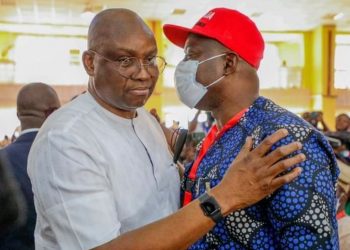A gender analyst representing the United Nations Population Fund, Dr. Ayodeji Uzoma, has urged advocates and champions of sexual gender-based violence (SGBV) to be proactive in addressing issues in their rural communities, where UNFPA could not reach them.
Dr. Uzoma also emphasised the importance of targeting the grassroots to eradicate harmful practices against humanity.
This call to action was made during a two-day training and mobilisation programme held at the Development Centre on November 25th and 26th, 2024.
Community-based organisations (CBOs), non-governmental organisations (NGOs), and civil society organisations (CSOs) organised the event to enhance their capacity to address SGBV.
The UNFPA, in collaboration with the Oyo State Government and the CPRH Centre for Comprehensive Promotion of Reproductive Health, University College Hospital (UCH), under the leadership of Prof. Oladosu Ogengbende, sponsored the programme aimed at promoting grassroots awareness and thorough sensitisation on SGBV.
Dr Uzoma reiterated the importance of pursuing the cause with clear objectives focused on rural communities. She emphasised that women and girls are the most vulnerable to abuse while stressing the need to leverage the 16-day activism against gender-based violence. This global campaign, themed “No Excuse, Unite to End Violence Against Women and Girls,” serves as a rallying cry to eliminate violence against women and girls.
The two-day training featured in-depth discussions on case scenarios, proposed solutions to challenges, and root causes of SGBV.
Participants explored the rights, privileges, and support available to survivors, the offences that attract penalties, and the stipulated punishments for perpetrators.
The training also covered psycho-social support, ground rules, confidentiality, and capacity-building for survivors.
Additionally, Mrs. Awosemusi Modupe Helen, a lawyer from the Ministry of Justice, explained the referral pathway for SGBV survivors and the protective provisions of the Violence Against Persons Prohibition (VAPP) law.
Furthermore, Alhaja Bilikisu Olawoyin from Oyo State Primary Health Care Board, along with Mrs. Olafunmilayo Akinpelu from MWASI, led sessions on orientation, sensitisation, and empowerment regarding acts of violence and abuse on women and girls. They both discussed the consequences and aftermath of Female Genital Mutilation (FGM).
Mr. Emmanuel Olumide Yelotan, a staff member of the facilitator at the Centre for Population and Reproductive Health UCH, shared effective strategies to achieve positive outcomes in combating SGBV. During an interactive session of the two-day training, he outlined urgent and feasible approaches to mitigate the menace and provided thoughtful responses to sensitive questions. They brought together two representatives from each rural local area in Oyo State.
Mr. Yelotan advised SGBV champions to build on lessons from previous experience to inform their future projects. He also emphasised the importance of community-led initiatives, “Work with Communities, not for Community,” to achieve excellence at the grassroots.
The ultimate target is to eradicate extremely harmful practices that violate human rights, with provisions in place for statistics, maintenance, community support, and feedback, not neglecting individuals with special needs.
In an interview with REPORTERS AT LARGE, Lawyer Modupe delved deeper into crucial aspects of addressing gender-based violence (GBV) on day two. She elaborated on the jurisdiction, institutional support, protection orders, and remedies available to victims (survivors).
She also discussed the rights of victims according to law, with a focus on cases of rape and how best to handle, visit, and follow up on GBV cases until they are resolved and closed. While she addressed the challenges of reporting amidst ignorance, cultural barriers, and stigma, she provided insights on how champions could identify GBV, the support to offer, and how to utilise the law to combat SGBV cases efficiently.
Director of Rural Development, Princess Adetona from Isemile Kajola LG areas of Oyo State, and Alhaja Mrs. Airat Ogungbenro from Atiba LG, representing the Federation of Muslim Women Association of Nigeria (FOMWAN), pledged with other Champions to take the SGBV gospel of total eradication and abandonment to rural communities, villages, and districts through thorough sensitisation connecting with teamwork, having been empowered and acquired knowledge with strategies at the two-day training and mobilisation.
NGOs, CBOs, and CSOs urged the Oyo State Government to address critical issues affecting survivors, including risk factors, and respond promptly to SGBV cases, ensuring survival and well-being.









